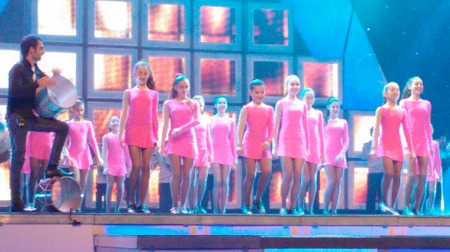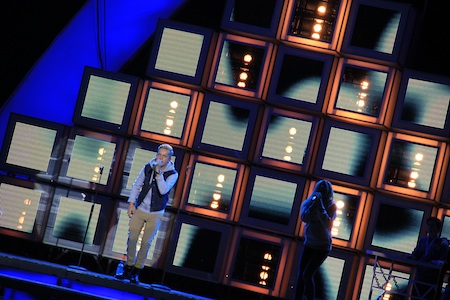Junior Eurovision is more than just entertainment for us. If we are looking for Junior Eurovision to be successful, we are looking to see stars being born. At least that is one theory of the contest.
That theory is examined by Ben Robertson to look if the success stories are starting to emerge. Do our artists feel good about the contest even after they win or lose? Does it lead to a better future for them?
It is all too easy to criticise Junior Eurovision. People can say that it is unfair to burden children with the responsibility of the nation. People can say that it puts young acts under too much pressure. That they can’t live up to the quality they aspire to through their adult role models. That it is not encouraging musicians to continue and is damaging rather than helping their future careers.
And so on and so on.
I plan to argue not just why Junior Eurovision does produce a perfect practice arena for our future talents, but also about how it may develop successes in other areas.
We Are Only 11 Years In
Junior Eurovision’s first assault on TV screens was back in 2003 from Copenhagen, where 16 countries took part in the competition. Back then the age limits were from 8 to 15, and some of the kids on stage were at this lower age limit. Those kids would only still be 19 today. Some, like the winner Dino Jelusic, are releasing music commercially, but not all.
This is one of the key points. Many people in discussing Junior Eurovision are able to pin-point just a couple of artists who made-it into real stars. Most of these lists start with the blonde girl from Moje 3 and end with the Tolmachevy Sisters (and might just mention Molly Sanden along the way if we get lucky). Yes we should celebrate that fact today in artists who are able to reach the Eurovision Song Contest proper, but it should not be our only measure of success. Especially when in reality we would expect about half of the acts to have to taken part in the contest to still be in full-time education.
The next few years is realistically the first time that the majority of those old Junior acts have even the chance to reach the big time. In the last twelve months we can pinpoint a handful more. From other national finals we can pinpoint Daniel Testa (Malta) and Viktoria Petrik (Ukraine) who were in the top 3 in their highly competitive selection procedures last year. Swedish Idol appears to be another stomping ground, former entrant Erik Rapp finished 3rd in last year’s competition and former Lilla Melodifestivalen Lisa Ajax is a hot favourite this season. Lisa, Amy and Shelley represented The Netherlands way back in Junior Eurovision 2007, and are still a trio rocking the limelight in The Voice Holland this autumn.
The young people that we see on November 15th will almost certainly disappear from public view after the contest. But in almost every case I expect them still to be attending school, practicing and perfecting their songwriting, learning new instruments, passing exams, finding boyfriends and girlfriends and simply growing up. Not everybody could nor should go from Junior Eurovision to being a superstar. That would not be our intention. We give opportunity for the children to be a big star for a day, limiting the damage that can be done to their developing minds and souls.
The Damage? What Damage?
Evidence that kids suffer due to Junior Eurovision is hard to find. Searching for previous entrants finds more often than not just examples where people are thankful, they rate the experience as one of the best ever. Daniel Testa is answered his Junior Eurovision experience as his ‘best moment on a holiday.’ Molly Sanden still describes it as the ‘best week of her life’. Rachel, 2nd in 2011, describes the experience as ‘magical’ and ‘amazing’ – just as it should be.
Fair enough you may think all three did well in the contest even though they didn’t win, so they would be really happy. That’s not the only truth. Thea Saliba ended in last place after Junior Eurovision 2005 representing Malta. Even reading interviews with her still pick out that Junior Eurovision was an enjoyable experience.
“We were having so much fun as though we were living in a dream that we held on strong performances throughout rehearsals and on the night of the contest achieving continuous positive views and comments from the press…All this and the instant support of numerous Junior and Eurovision international fans pushed me a step forward to believe in my product and exploit my music internationally.”
Source: ESC Flash Malta
The fact is, no matter where I look I can’t find evidence of any artists who found it to be a negative experience (if you can find any, please put them in the comments). Even searching for ‘Junior Eurovision Nightmare’ quest for a tabloid-style headline just comes up with Terry Vision interviewing last year’s Dutch twins.
Junior Eurovision is providing an experience that all of these children want and is being managed appropriately. Some issues exist, the age range of 10 to 15 is arguably still too large to make it possible to treat all competitors equally (an issue confirmed to ESC Insight by Executive Supervisor Vladislav Yakovlev is still discussed by the Reference Group) and that the cultural and political voting that tarnishes Eurovision at all levels does infiltrate down to the Junior contest on occasion. Nevertheless despite these frustrations the kids all demonstrate that it is a wonderful occasion.
Building For Successful Futures
Junior Eurovision is about the opportunities we are able to offer to the next generation. It puts the children in a wonderful place where they can play at being a star for a day, but get the best quality help from each country. Lilla Melodifestivalen is a perfect example of the nurturing process. This year at the final I note that all eight contestants were able to work with professional songwriters to spice up their entries. Winner Julia Kedhammar impressed Thomas G:Son so much that the pair continue to work together. Christer Björkman who is the top dog for all things Melodifestivalen spent a good five minutes after the show on stage with last year’s winner Elias.
Junior Eurovision provides contacts and chance to make it easier for the next generation to take the step up to the next level if they want to. Without this stepping stone many young artists across Europe would find the roads to success in the music industry blocked, and would not learn the tips of the trade. However they gain this exposure without the pitfalls that can come with fame. Sweden’s last two entrants to Junior Eurovision came to perform at my school here in Stockholm as the interval act for our own school Eurovision competition. They could walk around the hallways and blend into the other students without most batting an eyelid. They may have the experience of stars, but they are not yet recognised as stars.
However we should not be drawn to just looking at who gets fame in the music business as the only success. Many of the children aspire to be singers in the future, but many of them will also wish for other careers. At Junior Eurovision in Kiev last year, the acts revealed during the voting window what they want to do in ten years time. As you can see they did not all say they wanted to be an artist in the future, some of our participants have perfectly healthy goals in other fields.

Not all of the talented acts are going to continue as artists and dancers into their adult years, but will carry the experience with them
The whole Junior Eurovision experience is more than just the three minutes on stage, it’s representing your country; learning a dance routine; working with experienced adults; looking into the camera; travelling abroad and using English to communicate; conducting press interviews; and, nowadays, managing social media accounts. The artists will learn transferable skills that could be applied to a huge variety of different professions in the future. We have talented acts who will be given a chance to shine, a chance to be a star for the day, but they will go back to school, continue to study, and will emerge stronger no matter what it is they do later in life.
We can start to measure the successes of Junior Eurovision by all the artists that are now breaking through to the big time. However I urge you to do this with caution, and to limit believing that this is required for the whole experience to be a success. What Junior Eurovision does is give a wonderful start to the process which they can take in any direction without consideration for the final result on the Saturday night.









